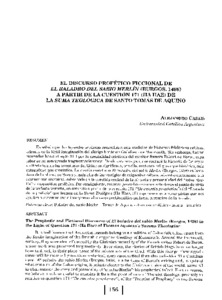Por favor, use este identificador para citar o enlazar este ítem:
https://repositorio.uca.edu.ar/handle/123456789/17322| Título: | El discurso profético ficcional de El baladro del sabio Merlín (Burgos, 1498) a partir de la cuestión 171 (IIa Ilae) de la Suma Teológica de Santo Tomás de Aquino The Prophetic and Fictional Discourse of El baladro del sabio Merlín (Burgos, 1498) in the Light of Question 171 (IIa Ilae) of Thomas Aquinos's Summa Theologiae |
Autor: | Casais, Alejandro | Palabras clave: | Tomás de Aquino, Santo, 1225?-1274; Baladro del sabio Merlín; EDAD MEDIA; LEYENDAS ARTURICAS; DISCURSO PROFETICO; MAGIA | Fecha de publicación: | 2005 | Editorial: | Pontificia Universidad Católica Argentina. Facultad de Filosofía y Letras | Cita: | Casais, A. El discurso profético ficcional de El baladro del sabio Merlín (Burgos, 1498) a partir de la cuestión 171 (IIa Ilae) de la Suma Teológica de Santo Tomás de Aquino [en línea]. Letras. 2005-2006 (52-53). Disponible en: https://repositorio.uca.edu.ar/handle/123456789/17322 | Resumen: | Resumen: Es sabido que las leyendas artúricas remontan a una tradición de historias folclóricas célticas , además de la fértil imaginación del clérigo británico Godofredo de Monmouth . Sin embargo, fueron marcadas hacia el siglo XIII por la mentalidad cristiana del escritor francés Robert de Boron, cuy a labor se ha conservado fragmentariamente . Desde entonces ya no se contará la historia de los reye s de Bretaña sino las aventuras del Grial; su significado, con ello, será más religioso que histórico, más catequético que cronístico . La novela castellana El baladro del sabio Merlín (Burgos, 1498) es heredera de la pluma de Boron y, más allá de los vestigios de raigambre céltica, adscribe claramente a l a cosmovisión cristiana, sobre todo en la cuestión central de la historia y personalidad del "sabio Merlín" : su capacidad profética . Por consiguiente, creernos provechoso examinarla desde el punto de vista de la teología tomista, en concreto a partir de la cuestión 171 ("De essentia prophetiae") del "Tratado de la profecía" que leemos en la Suma Teológica (IIa Ilae); allí esperamos encontrar pistas que no s ayuden a sistematizar e interpretar el a veces problemático material narrativo de la novela. Abstract: It is well known that Arthurian legends belong to a tradition of Celtic folk tales, apart from the fertile imagination of the British clergyman Geoffrey of Monmouth. Around the thirteenth century, they were also influenced by the Christian mentality of the French writer Robert de Boron , whose work was preserved fragmentarily. Ever since, the stories of British kings have no longer been told, but, in their place, those of the adventures of the Grail . With this change, their significante will be more religious than historical, more catechistical than chronicle-like . The Castilian novel El baladro del sabio Merlín (Burgos, 1498) is a heritage of Boron's writing and, in spite o f what remains of the Celtic origins, it adjusts clearly to the Christian vision of the world, aboye all in what regards the story and personality of"el sabio Merlin" : his prophetical talent . For this reason , we believe it will be useful to examine it from the point of view of Thomist theology, precisely in relation to question 171 ("De essentia prophetiae "), of the "Treatise of Prophecy" in the Summa Theologiae (IIa Ilae) . There we may find some clues to systematize and interpret the sometime s complex narrative material of the novel. |
URI: | https://repositorio.uca.edu.ar/handle/123456789/17322 | ISSN: | 0326-3363 | Disciplina: | LITERATURA | Derechos: | Acceso abierto | Fuente: | Letras. 2005-2006 No.52-53, 2005-2006 |
| Aparece en las colecciones: | LETRAS - 2005-2006 nro. 52-53 |
Ficheros en este ítem:
| Fichero | Descripción | Tamaño | Formato | |
|---|---|---|---|---|
| discurso-profetico-ficcional.pdf | 1,16 MB | Adobe PDF |  Visualizar/Abrir |
Visualizaciones de página(s)
35
comprobado en 27-abr-2024
Descarga(s)
14
comprobado en 27-abr-2024
Google ScholarTM
Ver en Google Scholar
Este ítem está sujeto a una Licencia Creative Commons

